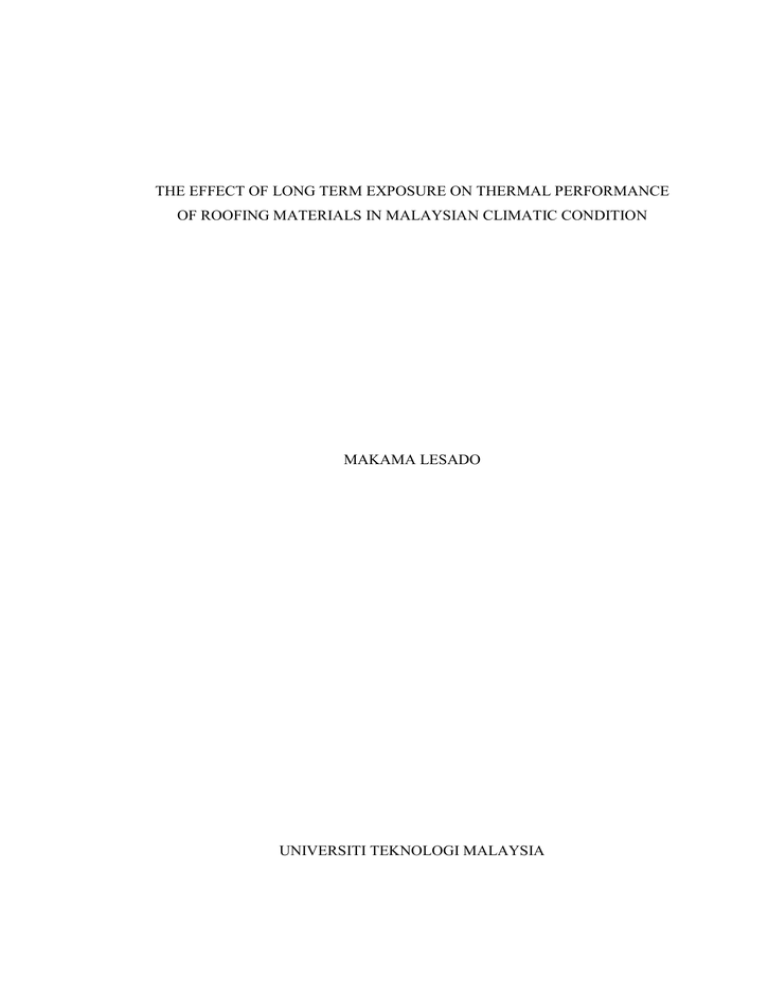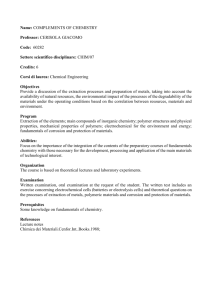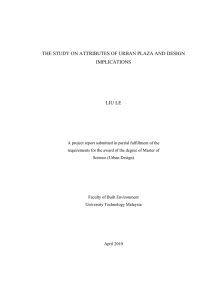THE EFFECT OF LONG TERM EXPOSURE ON THERMAL PERFORMANCE
advertisement

THE EFFECT OF LONG TERM EXPOSURE ON THERMAL PERFORMANCE OF ROOFING MATERIALS IN MALAYSIAN CLIMATIC CONDITION MAKAMA LESADO UNIVERSITI TEKNOLOGI MALAYSIA v THE EFFECT OF LONG TERM EXPOSURE ON THERMAL PERFORMANCE OF ROOFING MATERIALS IN MALAYSIAN CLIMATIC CONDITION MAKAMA LESADO A Thesis submitted in fulfilment of the Requirements for the award of Degree of Master of Science (Architecture) Faculty of Built Environment Universiti Teknologi Malaysia MARCH 2012 vii In loving memory of my father who passed away just before I came for the program and to my living mum who fanned this dream to reality. viii ACKNOWLEDGEMENT First and above all I praise God the almighty for the guidance, wisdom and perseverance he bestowed upon me during the course of my work and indeed, throughout my life. All glory and honor be unto him. The program was indeed a journey of faith and I would like to acknowledge those entire people God used to guide me through but time, and most especially, space would not let me. I can only mention a few to whom, I cannot sum up how immensely grateful I am; To UTM Skudai Johor - My place of learning Dr. Dilshan Remaz Ossen - My guide through the process along with aides like GIRG team The Hope family - My home away from home Mummy, Zhebati and Vala - My supporters, encouragers and providers John Anumah - My friend, my love, my teacher Juliet, Jayne, Jemila, Msurshima and Chinwe - My friends who stick closer than a brother Mr Saidu Mohammed, Wallace, Pst. Zinas, Yakubu Dodo, Ismaeel - The Nigerians who helped me like Nigerians would; helping out even when it was not convenient for them. Thanks for the opportunity you all gave me to benefit from a part of your lives in kindness and in sacrifice. The Lord reward you all. ix ABSTRACT Owing to exponential increase in world population and high influx of migrants to urban areas, demand for space in form of housing and infrastructure has increased in most urban centers yielding a high number of infrastructural developments requiring clearing of vegetative land cover and replacement by roofs and paved surfaces. The materials used in most cases have higher absorptive heat capacities than the soil and vegetation they replace resulting in the phenomenon known as Urban Heat Island (UHI) where urban areas are hotter than their surrounding rural areas. In tropical regions where solar radiation intensities are higher and rainfall is all year round, thermal performance of these materials is altered by the climatic conditions. The growing population and rising demand for infrastructure calls for careful evaluation of materials used in the urban fabric as a strategy for the mitigation of the UHI phenomenon. This study was carried out on commonly used roofing materials in Malaysian tropical climate; clay and concrete roof tiles adopting two methodologies for the samples. Full scale testing for concrete tiles measured between 12- 19th April, 2011 and exposure rack method for clay tiles measured 1st- 8th July, 2011. Surface and ambient temperature measurements were taken for seven days each by HOBO U-12 Data loggers on samples which had been exposed for varying durations of above 25years, 15years, 10years and less than one year. Climatic conditions such as relative humidity, air temperature and wind speed were recorded using the Environ Data weather station set- up on the study site of the UTM campus. Analysis was made using measures of descriptive analysis on Microsoft Excel and independent paired sample t-tests were carried out on SPSS software. Results showed that after over 25 years of exposure, maximum surface temperature of concrete tile dropped by 12% while the clay rose by 3.68%. Minimum surface temperature of concrete rose by about 2% and no significant changes were observed in the clay tile at night. Thermal performance evaluation of materials used in the urban fabric is essential as a passive solution to mitigating the negative effects of UHI. x ABSTRAK Peningkatan eksponen dalam penduduk dunia, kebanjiran pendatang yang tinggi ke pusat bandar serta permintaan bagi ruang perumahan dan infrastruktur telah menyebabkan peningkatan pembangunan infrastruktur yang tinggi. Pembersihan hutan dan kawasan hijau telah banyak dilakukan untuk digantikan dengan bumbung dan permukaan berturap. Penggantian bahan-bahan yang mempunyai kapasiti penyerapan haba daripada tanah dan tumbuh-tumbuhan telah mengakibatkan fenomena yang dikenali sebagai Kepulauan Haba Bandar (UHI) di mana kawasan bandar adalah jauh lebih panas berbanding kawasan luar bandar. Di kawasan tropika, keamatan sinaran suria adalah tinggi, hujan sepanjang tahun dan prestasi terma bahan diubah oleh keadaan iklim. Pertambahan penduduk dan permintaan infrastruktur yang semakin meningkat memerlukan penilaian dalam fabrik bandar sebagai satu strategi untuk mengurangkan fenomena UHI. Kajian ini dijalankan ke atas bahan bumbung yang biasa digunakan dalam iklim tropika Malaysia. Tanah liat dan jubin bumbung konkrit digunakan sebagai dua kaedah sampel. Ujian skala penuh bagi jubin konkrit diukur di antara 12-19 April, 2011 dan pendedahan rak kaedah untuk jubin tanah liat diukur pada 1-8hb Julai, 2011. Permukaan dan pengukuran suhu ambien telah diambil selama tujuh hari setiap satu oleh HOBO U12. Data log di ambil ke atas sampel yang terdedah untuk pelbagai tempoh masa; 25 tahun ke atas, 15 tahun, 10 tahun dan kurang daripada 1 tahun. Keadaan iklim seperti kelembapan relatif, suhu udara dan kelajuan angin telah direkodkan menggunakan EnvironData stesen cuaca set-up di kajian tapak kampus UTM. Analisis deskriptif pada Microsoft Excel dan sampel T- test telah dijalankan ke atas perisian SPSS. Keputusan menunjukkan bahawa selepas pendedahan melebihi 25 tahun, suhu permukaan maksimum jubin konkrit menurun sebanyak 12% manakala tanah liat meningkat sebanyak 3.68%. Suhu permukaan minimum konkrit meningkat sebanyak kira-kira 2% dan tiada perubahan ketara telah diperhatikan dalam jubin tanah liat pada waktu malam. Penilaian prestasi terma bahan yang digunakan dalam fabrik bandar adalah perlu sebagai satu langkah penyelesaian yang baik untuk mengurangkan kesan-kesan negatif UHI.

